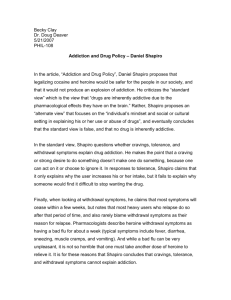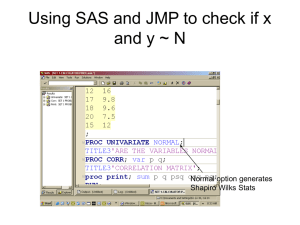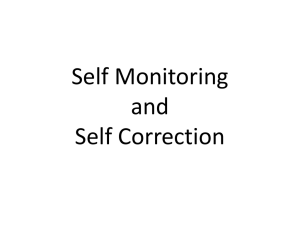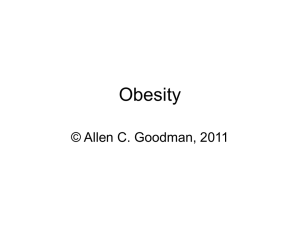Exam Room Utilization - Joslin Diabetes Center
advertisement
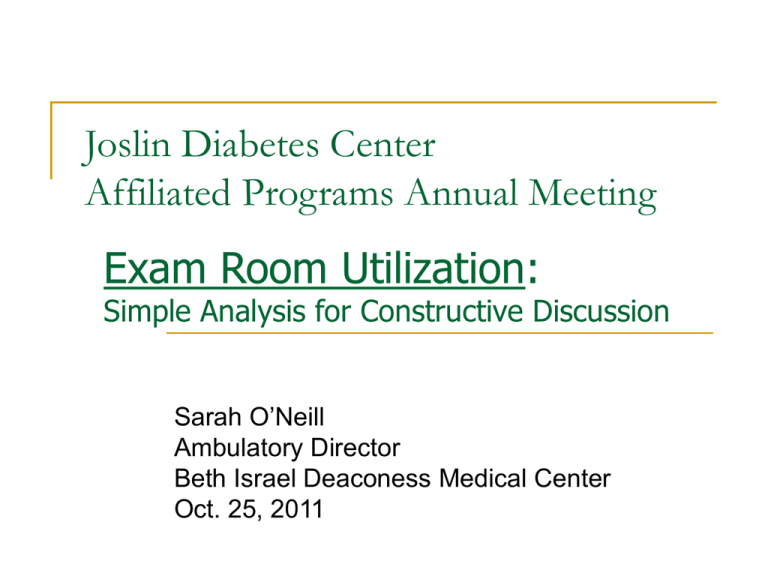
Joslin Diabetes Center Affiliated Programs Annual Meeting Exam Room Utilization: Simple Analysis for Constructive Discussion Sarah O’Neill Ambulatory Director Beth Israel Deaconess Medical Center Oct. 25, 2011 Background Beth Israel Deaconess Medical Center Tertiary Care Teaching Hospital 631 licensed beds 429 medical/surgical beds 77 critical care beds 60 OB/GYN beds Background BIDMC Ambulatory Services 625,000 outpatient visits annually 15% Primary Care 85% Specialty Care 350,000 (56%) of outpatient visits Med/Surg office practice BIDMC owned facilities Background Academic Medical Center Faculty physicians part of separate partner organization Faculty physician schedules complex – Clinical, Teaching, Research MD Trainee education integrated into outpatient practice 83 Fellows 257 Residents and Interns Context Medical office practice growing on average 4% a year 2007 three year strategic development – MD recruitment in many ambulatory areas Market analysis indicated optimal location in Boston GME credentialing required expanded outpatient experience Context Space tight on campus Increased need for additional space for on campus off practice Cost of significant renovations prohibitive The Goal Understand utilization – are we truly using what we have Develop standard and fair measure to inform decision making Decision Making to Date Based on room reservation schedules Anecdotal reports of actual practice sessions Ad hoc site visits range from overflowing to empty Little detail beyond # of planned physician recruits Failed efforts to assess use based on patient time in room Beginning the Conversation Initial analyses reviewed Weekday use Reservation use Weekday Use Request for more space based on peak usage Is usage even across the week? Ambulatory Services FY 06 Office Practice Annual Scheduled Hours by Day of Week % of Weekday Capacity Scheduled Hours (incl. factor for room turnover) Exam Room Weekday Capacity in Hours (at 85% util.; adj. for Holidays and Peak Factor) Annual Hours 120,000 100,000 80,000 74% 72% 69% 67% 60,000 53% 40,000 20,000 0 Monday Tuesday Wednesday Thursday Friday Ambulatory Services FY 06 Office Practice Annual Scheduled MORNING Hours by Day of Week % of Weekday Capacity Scheduled Morning Hours (incl. factor for room turnover) Exam Room Weekday Capacity in Hours (at 85% util.; adj. for Holidays and Peak Factor) 60,000 Annual Hours 50,000 87% 94% 87% 88% 40,000 86% 30,000 20,000 10,000 0 Monday Tuesday Wednesday Thursday Friday Ambulatory Services FY 06 Office Practice Annual Scheduled AFTERNOON Hours by Day of Week % of Weekday Capacity Annual Scheduled Hours Exam Room Weekday Capacity in Hours (at 85% util.; adj. for Holidays and Peak Factor) 60,000 Annual Hours 50,000 40,000 63% 67% 73% 56% 30,000 41% 20,000 10,000 0 Monday Tuesday Wednesday Thursday Friday Weekday Use Helped identify unused capacity – reduced the anecdotal “noise” Data for analysis not readily available Analysis at the appointment level – huge amount of data Limited ability to dig in to detail by service or provider Reservation Use Exam room “reserved” for regular weekly session Reserved session = 4 hours Use of Reserved Hours red bold = >92% or 48 weeks worked green bold = < 85% or 44 weeks worked Utilization of Reserved Exam Room Time practice location Annualized Reserved Hours FY 07 Total Actual SCHED Hours % of time in the year reserved hours open % of time in the year reserved hours used Equivalent weeks worked out of 52/yr Weeks Open Shapiro 5b 12,450 13,082 -5% 105% 55 (3) Shapiro 8a 16,000 16,154 -1% 101% 53 (1) Annualized60,050 Shapiro 2c 11,300 Reserved Shapiro 7b 19,300 Shapiro 8b 32,400 Hours (50 weeks) 53,069 12% 88% 46 6 9,608 15% 85% 44 8 14,845 23% 77% 40 12 20,520 37% 63% 33 19 Shapiro 6,1 Rabb 1 8,650 5,374 38% 62% 32 20 Shapiro 2a 4,400 2,310 48% 53% 27 25 Shapiro 3a 6,400 3,277 49% 51% 27 25 8,223 55% 45% 23 29 191,053 24% 76% 39 13 4,638 -11% 111% 58 (6) 2,841 4% 96% 50 2 Shapiro 7c LMOB 7 LMOB 5a Actual 18,400 252,400 Scheduled4,175 Hours 2,950 LMOB 5 5,500 4,982 9% 91% 47 5 LMOB 4 8,050 7,051 12% 88% 46 6 LMOB 3a 2,750 2,329 15% 85% 44 8 5,450 red bold = >92% or 48 weeks3,619 worked LMOB 6 3,800 2,283 green bold = < 85% or 44 weeks worked LMOB 3b 4,000 1,332 Range 15% 105% LMOB 2a 3,000 445 34% 66% 35 17 40% 60% 31 21 67% 33% 17 35 85% 15% 8 44 65,250 30% 70% 37 15 LMOB 1 45,969 Reservation Use Helpful Highlights wide variation Clinical contract oversight – length of sessions, cancellations, make ups, etc. Ongoing review of space available for others to reserve Reinforced existing space still available Long term usefulness Evaluates reserved time only More provider use of reserved time versus space use Depends on managers providing schedules Based on a snapshot in time (schedules change) Finding a Simpler Metric Use more readily available data Not dependent on practice management Evaluates 12 months – level seasonal and academic variation From scheduling system – existing data extract Available at clinic and provider level Analyses exam room versus provider use Premise of Metric Physician schedule reliable - needs to reflect real average time needed for each visit type Begin generously Scheduled versus kept activity All visits – within session or add on Based on weekday use – any extended hours improves metric Exam Room Availability Assume room available 8 hours, M-F Two 4 hours sessions 250 days a year (less 10 holidays) One room available 2,000 hours/year For each practice suite - include all clinics/ providers (MDs, NPs, etc.) using exam room space in that location Calculation at Practice Level % Utilization = Annual Scheduled Hours # exam rooms x 2,000 hrs PROVIDER TIME IN ROOM Practice Location Available Exam Rooms Total Actual Scheduled Visits % of time exam room used by provider (b,e) Shapiro 2c 9 24,997 51% Shapiro 8b 18 28,602 53% Shapiro 9 21 32,375 54% Shapiro 7a 8 9,698 48% Shapiro 6,1 60 114,498 44% Shapiro 3b 14 24,826 34% 13 19,546 36% 10 14,802 31% 6 6,125 20% 3 3,135 26% 205 372,204 44% LMOB 4 7 11,970 45% LMOB 1 3 4,240 50% LMOB 8b 4 7,986 38% LMOB 7 5 7,715 40% LMOB 8a 5 10,138 33% LMOB 0B 9 10,679 33% LMOB 5 7 8,851 25% LMOB 3b 3 2,860 24% LMOB 6 6 5,489 18% LMOB 2a,b 2 1,351 13% 67 95,139 29% Shapiro 7c Shapiro 2a Shapiro 5a Shapiro 3a TOTAL EAST TOTAL WEST % Time Provider in Room Range 13% - 54% Calculation at Practice Level % Utilization = Annual Scheduled Hours + Room turnover # exam rooms x 2,000 hrs PROVIDER “PLUS” TIME IN ROOM Simple standard/ average factor Based on variety of observations Practice Location Available Exam Rooms Total Actual Scheduled Visits % of time exam room used by provider (b,e) Average Minutes/ Visit Exam Room Utilization Shapiro 2c 9 24,997 51% 37 86% Shapiro 8b 18 28,602 53% 52 69% Shapiro 9 21 32,375 54% 52 67% Shapiro 7a 8 9,698 48% 61 61% Shapiro 6,1 60 114,498 44% 38 60% % Time Provider in Room Range 13% - 54% Shapiro 3b 14 24,826 34% 36 53% Shapiro 7c 13 19,546 36% 39 49% Shapiro 2a 10 14,802 31% 35 43% Shapiro 5a 6 6,125 20% 33 38% Shapiro 3a 3 3,135 26% 42 37% 205 372,204 44% LMOB 4 7 11,970 45% 44 63% LMOB 1 3 4,240 50% 53 62% TOTAL EAST Provider plus turnover time Range 18% - 99% 62% LMOB 8b 4 7,986 38% 33 55% LMOB 7 5 7,715 40% 41 53% LMOB 8a 5 10,138 33% 30 50% LMOB 0B 9 10,679 33% 43 42% LMOB 5 7 8,851 25% 39 41% LMOB 3b 3 2,860 24% 40 32% LMOB 6 6 5,489 18% 33 25% LMOB 2a,b 2 1,351 13% 31 18% 67 95,139 29% TOTAL WEST 42% The New Metric Adding turnover time helped Appropriately adjust for shorter visit, higher room turnover time needed Shift focus to relative variation versus absolute % The relative outcomes passed the “smell” test – fit known practice experience Discussion turned to use of existing space Increased interest in ways to use space more efficiently Why the Range? Review of space model Offices integrated into practice Practice suite separate from offices Optimal practice size Small (5 or less) suites less flexible 10 to 12 exam rooms with proper support space most efficient Critical for specialties balancing OR/ procedure and office visit time Physician clinical commitment oversight Options for maximizing Space Move support functions out of exam rooms Limit physicians to 2 rooms per session Start and end sessions on time Shared space use Schedule meetings outside of practice hours Rearrange commitments so full session used Shift session to offsite facilities Extend hours – evenings and weekends Further Analysis at MD Level KEPT Visits Throughput Unigue Patients/ PANEL (Based on scheduled activity) at 50 weeks/ year (h); Visits/ RESERVED ROOM Avg. Weeks Worked per RESERVE D ROOM at avg. weeks worked; Visits/ RESERVE D ROOM Provider Total Kept % Not Kept New to Clinic (b) % New (b) Panel Last 12 Mos Panel/ RESERVED ROOM Avg. Visits/ Patient Annual visits/ RESERVE D ROOM Provider 9 314 21% 192 61% 221 221 1.4 314 6.3 55 6 Provider 8 418 16% 242 58% 260 173 1.6 279 5.6 44 6 Provider 6 737 21% 218 30% 361 120 2.0 246 4.9 35 7 Provider 3 316 20% 77 24% 240 240 1.3 316 6.3 32 10 Provider 7 358 24% 108 30% 214 107 1.7 179 3.6 27 7 Provider 2 1,373 13% 138 10% 695 116 2.0 229 4.6 22 10 Provider 5 858 20% 140 16% 342 68 2.5 172 3.4 21 8 Provider 1 1,719 15% 233 14% 1,178 168 1.5 246 4.9 18 14 Provider 4 237 22% 27 11% 172 86 1.4 119 2.4 14 8 6,330 18% 1,375 18% 3,683 1.7 119 2.4 25 5 Total Outcome from use of new metric Generated a broad guideline to begin to filter/ prioritize space requests Eventually moved to kept rather than scheduled hours Utilization Guideline Current guidelines using KEPT VISITS as base >60% 50% TO 60% Optimal space Approaching utilization maximum use usage that request space adjusts for peaks and or and allows for implement urgent add on decompression sessions without opportunities difficulty. 40% TO 50% < 40% Reasonable use but with potential for growth or sharing underused sessions Under use consider consolidation with other services Exam Room Utilization Practice Exam Rooms FY 08 FY 09 FY 10 Shapiro 7b 14 60% 61% 61% cannot add sessions Shapiro 2c 17 49% 51% 54% limited ability to add Shapiro 8a 18 56% 56% 53% Shapiro 8b 22 57% 61% 51% Shapiro 9 21 43% 43% 52% Shapiro 3b 13 46% 46% 48% Shapiro 7a 8 53% 53% 47% Rabb 1 9 39% 43% 43% Shapiro 2b 4 13% 39% 47% Shapiro 2a 10 43% 39% 40% 234 46% 48% 48% LMOB 8a 5 48% 60% 60% LMOB 1 5 47% 49% 48% LMOB 7 6 43% 44% 49% LMOB 4 9 49% 52% 55% Deac 1 5 8% 11% 49% LMOB 8b 4 44% 51% 55% LMOB 5 4 35% 35% 38% B/P Span 3 6 40% 40% 37% LMOB 6 5 25% 34% 32% LMOB 3a 5 21% 19% 19% 73 41% 43% 46% room for growth limited ability to add room for growth Outcome – Improved use of existing space Simplified/standardized use of scheduling templates Reduced cancellations due to competing commitments in research and teaching Encouraged creative options for existing space Better sharing across divisions Office/exam room for more full time clinicians Minimized/delayed the need for renovations Outcome – Improved use of existing space Annual Volume increased by 64,000 visits 14 exam rooms added during that time Questions?

